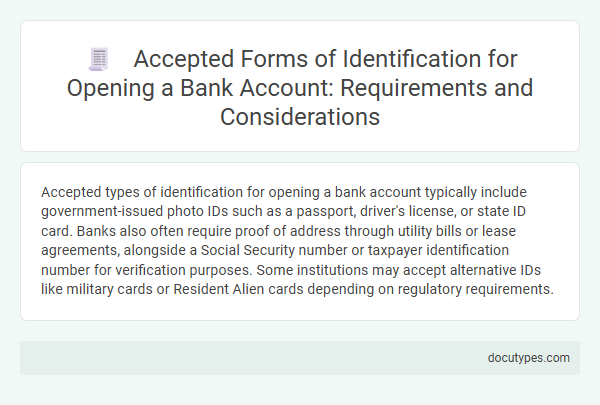Accepted types of identification for opening a bank account typically include government-issued photo IDs such as a passport, driver's license, or state ID card. Banks also often require proof of address through utility bills or lease agreements, alongside a Social Security number or taxpayer identification number for verification purposes. Some institutions may accept alternative IDs like military cards or Resident Alien cards depending on regulatory requirements.
Introduction to Bank Account Identification Requirements
Identifying yourself is a crucial step when opening a bank account. Banks require specific types of identification to comply with legal and regulatory standards.
- Government-issued Photo ID - Valid passports, driver's licenses, or state ID cards confirm your identity and residency.
- Proof of Address - Utility bills, lease agreements, or bank statements verify where you live.
- Social Security Number or Tax Identification Number - These numbers are essential for tax reporting and fraud prevention.
Your identification documents must be current and authentic to successfully complete the account opening process.
Why Banks Require Identification
Banks require identification to verify the identity of account holders and prevent fraud. Accepted types of identification typically include government-issued IDs such as passports, driver's licenses, and national identity cards. These documents help ensure compliance with legal regulations like anti-money laundering laws.
Primary Forms of Acceptable Identification
Primary forms of acceptable identification for opening a bank account typically include government-issued documents such as a passport, driver's license, or national ID card. These IDs serve to verify your identity and comply with banking regulations.
Banks require identification that contains your full name, date of birth, photograph, and signature for authentication purposes. Some institutions may also accept a state-issued ID or permanent resident card. Always check with the specific bank for their list of approved primary IDs before applying.
Secondary Forms of Approved Identification
Secondary forms of approved identification for opening a bank account typically include documents that support your primary ID, ensuring verification accuracy. Common examples include utility bills, rental agreements, or government-issued cards such as a social security card or a tax identification number.
These secondary IDs help confirm your address and personal information, supplementing your primary identification like a passport or driver's license. Banks may also accept student IDs and employer-issued identification cards, depending on their specific requirements and policies.
Special Considerations for Non-Citizens and Foreign Nationals
Accepted types of identification for opening a bank account commonly include government-issued photo IDs such as passports, driver's licenses, and national identity cards. Banks may also require proof of address and a Social Security Number or Tax Identification Number.
Non-citizens and foreign nationals often face special considerations, as some banks require additional documentation like visas, work permits, or residency cards. You should verify specific bank policies, as requirements can vary significantly depending on your immigration status and country of origin.
Identification for Minors and Students
What types of identification are accepted for opening a bank account for minors and students? Banks typically require government-issued IDs such as passports, birth certificates, or state-issued ID cards for minors. Students may also use student ID cards along with a Social Security number or taxpayer identification number for verification.
Digital and Electronic Identification Options
Accepted identification types for opening a bank account include digital and electronic options such as government-issued eIDs, mobile driver's licenses, and biometric verification methods. Many banks support identity verification through secure smartphone applications that utilize facial recognition or fingerprint scanning. These digital identification methods enhance convenience while maintaining compliance with regulatory standards like KYC (Know Your Customer) and AML (Anti-Money Laundering).
Handling Expired or Unavailable Identification
Identifying yourself accurately is crucial when opening a bank account. Handling expired or unavailable identification can require additional steps to verify your identity.
- Primary Identification - Valid government-issued IDs like a passport or driver's license are typically required for account opening.
- Expired Identification Handling - Some banks may accept recently expired IDs if supplemented with additional proof of identity or residency.
- Alternative Documents - When standard IDs are unavailable, banks might accept secondary documents such as utility bills or social security cards for verification.
Exceptions and Alternative Verification Methods
Accepted types of identification for opening a bank account generally include government-issued photo IDs. Exceptions exist where alternative verification methods are necessary due to lack of standard documentation.
- Primary Government IDs - Passport, national identity card, or driver's license are commonly accepted for account verification.
- Exceptions for Undocumented Individuals - Some banks allow non-traditional documents like utility bills or letters from community leaders as proof of identity.
- Biometric Verification - Fingerprints or facial recognition serve as alternative methods when physical IDs are unavailable or insufficient.
What Types of Identification Are Accepted for Opening a Bank Account? Infographic

